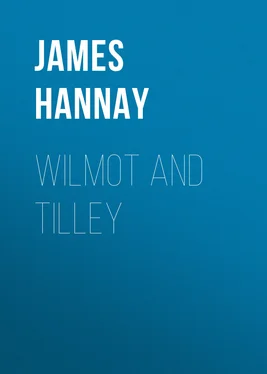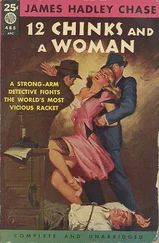James Hannay - Wilmot and Tilley
Здесь есть возможность читать онлайн «James Hannay - Wilmot and Tilley» — ознакомительный отрывок электронной книги совершенно бесплатно, а после прочтения отрывка купить полную версию. В некоторых случаях можно слушать аудио, скачать через торрент в формате fb2 и присутствует краткое содержание. Жанр: foreign_prose, foreign_antique, на английском языке. Описание произведения, (предисловие) а так же отзывы посетителей доступны на портале библиотеки ЛибКат.
- Название:Wilmot and Tilley
- Автор:
- Жанр:
- Год:неизвестен
- ISBN:нет данных
- Рейтинг книги:3 / 5. Голосов: 1
-
Избранное:Добавить в избранное
- Отзывы:
-
Ваша оценка:
- 60
- 1
- 2
- 3
- 4
- 5
Wilmot and Tilley: краткое содержание, описание и аннотация
Предлагаем к чтению аннотацию, описание, краткое содержание или предисловие (зависит от того, что написал сам автор книги «Wilmot and Tilley»). Если вы не нашли необходимую информацию о книге — напишите в комментариях, мы постараемся отыскать её.
Wilmot and Tilley — читать онлайн ознакомительный отрывок
Ниже представлен текст книги, разбитый по страницам. Система сохранения места последней прочитанной страницы, позволяет с удобством читать онлайн бесплатно книгу «Wilmot and Tilley», без необходимости каждый раз заново искать на чём Вы остановились. Поставьте закладку, и сможете в любой момент перейти на страницу, на которой закончили чтение.
Интервал:
Закладка:
But the grievance which caused the greatest amount of dissatisfaction in New Brunswick was that which arose from the management of the Crown lands. It was bad enough that the revenues arising from the public domain should be disposed of without the consent of the legislature; but it was still worse when such regulations were made by the surveyor-general as hindered the settlement of the country and interfered with one of its leading industries. One great abuse was that large areas of the best land in the province were locked up as reserves for the production of masts for His Majesty's navy. Another grievance was the imposition of a duty of a shilling a ton on all pine timber cut in the province. This was done by the authority of the surveyor-general, and its effect was seriously to injure many of those who were engaged in lumbering. This tax was remitted for a time after the panic of the year 1825, but it was revived when that crisis in the commercial life of the province had passed. The management of the Crown lands office had been the subject of criticism at almost every session of the legislature for twelve or fifteen years before Lemuel Wilmot entered public life, and every year the complaints grew louder.
AN ADDRESS TO THE KING
At the session of 1831, an address was presented to the president, the Hon. William Black, asking him to lay before the House a detailed account showing the amount of the casual and territorial revenue from the beginning of 1824 to the end of 1830, and the expenditures from that fund for the same period. This was refused on the ground that it was inconsistent with his instructions. The House then resolved to bring the matter to the notice of the king in an address, the spirit of which may be gathered from the following paragraphs:—
"By the operation of the system practised in this office, very large sums are taken from the people of this province for licenses to cut timber on Crown land, and, although the assembly do not question the right Your Majesty undoubtedly has to the lands in question, they think the tremendous powers with which the commissioner is vested, with regard to impositions of tonnage money and the enormous exactions for fees, to be incompatible with a free government, and to require redress.
"It is generally understood, as well as universally believed, that the commissioner in question is under no control in this province, and to this may be ascribed the mode in which licenses to cut timber are issued in very many cases, in quantities less than one hundred tons, subject to a duty of one shilling, three pence per ton, and the excessive fee on each of forty-five shillings. By this mode, a large part of the receipts is paid in the shape of fees, at once injuring the subject without benefiting the revenue; and the assembly feel convinced, if the office were under colonial management, that while the oppressions would be removed, the revenue would be more productive; and besides, the assembly cannot but view with just alarm that the day may possibly come when, by a single mandate from the office, exactions of such magnitude may be made as literally to stop the export trade of the country, a power which no person should have even the shadow of authority to exercise.
"The assembly at an early day in the present session, by an address to the administrator of the government, sought for documents regarding this office, to enable them officially to bring the subject more in detail under the consideration of Your Majesty, but this information, so highly desirable and necessary, has been withheld from them; and the assembly, therefore, with great submission, lay before Your Majesty herewith, a copy of the said address, with the reply thereto, for Your Majesty's gracious consideration.
"It will by that be seen that the objects contemplated by the assembly are no less than relieving Your Majesty's government permanently from the burthen of the whole civil list of the province, a subject which the assembly humbly conceive to be of great advantage to the parent state, and only requiring that the revenues, from whatever source or sources derived in or collected within the province, should be placed under the control of its legislature."
THE CIVIL LIST
A portion of the Crown-land revenue went to pay what was termed the civil list, which included the salaries of the lieutenant-governor, the judges, the attorney-general, solicitor-general, private secretary, provincial secretary, auditor, receiver-general and commissioner of Crown lands. The latter official received seventeen hundred and fifty pounds sterling per annum besides enormous fees, so that his income was greater than that of the lieutenant-governor. Thomas Baillie, an Irishman, who had been a subaltern in a marching regiment, had filled that office since the year 1824, and continued to hold it until 1851, twenty-seven years in all, when he retired with a pension twice as large as the salary of the present surveyor-general of New Brunswick.
What the Reformers in the legislature of New Brunswick sought to obtain was the control of the public lands, and the disposal of the revenues derived from them. To accomplish this they were willing to undertake to pay the salaries embraced in the civil list, although these salaries were looked upon by the people of the province generally as altogether too large. Yet there were great difficulties in the way of this necessary reform, for King William IV was known to be violently opposed to it. At a later period, 1835, in the course of a conversation with the Earl of Gosford, who had been appointed governor of Lower Canada, "I will never consent," he said with an oath, "to alienate the Crown lands, nor to make the council elective. Mind me, my Lord, the cabinet is not my cabinet. They had better take care, or by – I will have them impeached."
Such was the language which this king used in regard to his constitutional advisers. It was fortunate for New Brunswick and the other colonies of British North America that at that time he had done his utmost to get rid of his ministers and had been defeated and humiliated, so that they could set him at defiance. But in 1832 they were more disposed to defer to his wishes, and in May of that year we find Lord Goderich, the colonial secretary, writing to Sir Archibald Campbell, the lieutenant-governor of New Brunswick, in the following strain:—
"The preservation to the Crown of the territorial revenue is an object of the first importance, and it would only be resigned on its being clearly proved that the right of the Crown could not be maintained without producing still greater inconvenience. You cannot, therefore, more usefully exert your influence than in endeavouring to prevent the assembly from urging the surrender of this revenue."
CONTROL OF THE REVENUE
The question of the control of the Crown-land or casual and territorial revenues was made the subject of an address to the king by the House of Assembly in 1832. In this it was stated that the expense of collecting these revenues was far greater than it would be under proper management, and it was proposed that they be placed under the control of the legislature, which would undertake the payment of all the necessary expenses of the civil government of the province by making such permanent and other grants as might be necessary for this purpose. The reply to this proposition was received during the legislative session of 1833. In it Lord Goderich, with some appearance of sarcasm, observed that "His Majesty did not consider it necessary at present to call upon the House for a grant of the nature proposed, as he did not anticipate such a falling off in the revenue at his disposal as the House appeared to have apprehended." This reply can hardly be regarded otherwise than as an insult to the House of Assembly, for the meaning of their address to the king was deliberately misrepresented. They were contending for a principle, that the revenue derived from the public domain should be under the control of the legislature, and the amount of the revenue did not enter into the question.
Читать дальшеИнтервал:
Закладка:
Похожие книги на «Wilmot and Tilley»
Представляем Вашему вниманию похожие книги на «Wilmot and Tilley» списком для выбора. Мы отобрали схожую по названию и смыслу литературу в надежде предоставить читателям больше вариантов отыскать новые, интересные, ещё непрочитанные произведения.
Обсуждение, отзывы о книге «Wilmot and Tilley» и просто собственные мнения читателей. Оставьте ваши комментарии, напишите, что Вы думаете о произведении, его смысле или главных героях. Укажите что конкретно понравилось, а что нет, и почему Вы так считаете.












